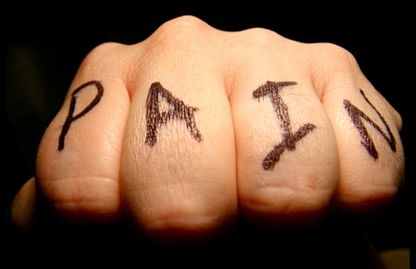|
Pain is part of the human experience.
While pain is clearly felt in the body, some consider it an emotion. Aristotle referred to it as a "passion for the soul." How we feel, express, deal with pain greatly depends on our interpretation of it. Our attitude and beliefs about pain largely stem from our cultural experiences growing up. This week I read a research article called "The Intersection of Pain and Culture", by NetCE, which takes a look at what research is saying about pain and how our cultural heritage can change our experience with pain. With an estimated 20% of adults experiencing pain every year, and since one out of ten adults is diagnosed with chronic pain, we need to start paying attention. Likely you know of a co-worker, family member, friend, or acquaintance whose life is affected on a daily basis by pain. By exploring this topic I hope you gain better insight into your own expression of pain and learn to recognize appropriate responses to the pain of others. Which culture you come from affects not only the way you talk about pain, but also how you feel it. For example, studies show Mexican-Americans often believe that it is their duty to their family, community, and God to endure pain stoically. "Some patients may feel that pain is bestowed by God and/or is part of familial or societal obligations." In this light, pain can be seen as a test of faith or loyalty to God. In another study, African-American and Hispanic participants demonstrated lower pain tolerance to cold and heat compared to their White counterparts. Not surprisingly, the coldest portions of the globe are dominated by White groups. Some studies show how the stress of acculturation can increase one's sensitivity to pain. Just imagine, you feel physical pain stronger and more often when trying to adapt to a new culture or perhaps dealing with racism. This is not something most people know about, but it can affect many, many people. Individualistic cultures, such as Americans, tend to emphasize their ability to makes changes around them; thus, they are more likely to use coping strategies aimed at trying to change their environment or to withdraw into themselves. On the other hand, collectivist cultures tend to emphasize control given to others, thus utilizing more passive coping strategies such as prayer. The terms we use to describe pain are influenced by culture as well. While many cultures use the words "pain," "ache," and "hurt," the same words often convey a differing level of pain intensity for different groups. Some groups have many descriptions. The Cantonese Chinese who use 597 different pain descriptors. Others use more vivid imagery like some Native Americans tribes, which may use terms such as "stretching," "throbbing," "pulling," "hot lava," "freezing," "sparks," and "electric shocks." It is important to listen to the language others use and explore their meaning, as interpretations can be different. Now let's take a look at our own expressions of pain. Let's start by considering these questions: 1) When you were a child, how did those who cared for you react when you were in pain? 2) How did they expect you to behave when you had a minor injury? 3) How did they encourage you to cope when you had severe pain? 4) How did they encourage you to behave during an injection or procedure? 5) When those who cared for you as a child were in pain, how did they react? 6) What words did they use to describe the pain? 7) How did they cope with their pain? 8) Do you tend to follow their example? Now let's think about how you currently express pain: 1) What painful experiences have you had as an adult? 2) How did you express (or not express) your pain? 3) Did the pain cause you fear? What were you afraid of? 4) How did you cope with the pain? 5) How did you want others to react while you were in pain? I find it good practice to reflect on one's own reactions to pain in order to move forward with more self-awareness and better choices. When we remain strangers to ourselves, we live our lives on autopilot. We lack direction and satisfaction. Socrates once said "An unexamined life is not worth living." Take a look at your relationship to pain. You never know how it can change you. Warmly, Stephanie Patterson, M.S., LMFT (805) 284-0724 San Luis Obispo and Atascadero, California www.SLOfamilyCounseling.com Comments are closed.
|

 RSS Feed
RSS Feed